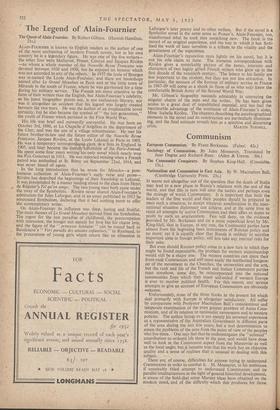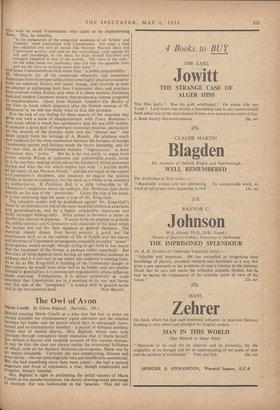Communism
European Communism. By Franz Borkenau. (Faber. 42s.) Sociology of Communism. By Jules Monnerot. Translated by Jane Degras and Richard-Rees. (Allen & Unwin. 30s.) The Communist Conspiracy. By Stephen King-Hall. (Constable. 15s.) Nationalism and Communism in East Asia. By W. Macmahon Ball. (Cambridge University Press. 25s.) IT seems not altogether out of the question that the death of Stalin may lead to a new phase in Russia's relations with the rest of the world, and that this in turn will alter the tactics and perhaps even the strategy of world Communism. It is important that both the leaders of the free world and their peoples should be prepared to meet such a situation, to accept whatever amelioration in the inter- national situation diplomacy can achieve, and at the same time to resist all attempts by native Communists_ and their allies or dupes to profit by such an amelioration. Few will deny, on the evidence provided by Mr. Borkenau and on a more superficial level by Mr. King-Hall, that in Europe, at any rate, the Communist parties have almost from the beginning been instruments of Russian policy and no more; yet it is equally clear that Russia is unlikely fo sacrifice important aims in foreign policy, still less take any internal risks for their sake.
But' even should Russian policy come to a new turn in which they might be found expendable, the problem for western statesmanship would still be a major ono. The western countries can spare their front-rank Communists and still more easily the intellectual hangers- on' of the movement in the Churches, the universities and the arts, but the rank and file of the French and Italian Communist parties must somehow, some day, be reincorporated into the national communities from which they stand self-exiled if western Europe is ever to recover political health. For this. reason, any serious attempts to give an account of European Communism are obviously welcome.
Unfortunately, none of the three books in the present list which deal primarily with Europe is altogether satisfactory. All suffer by comparison with Professor Macmahon Ball's conscientious and temperate examination of the even greater problem 'of Asian Com- munism, and of its relation to nationalist movements and to western policies. The author brings to it not merely his personal experience as a representative of the Australian Govenfment in different parts of the area during the last few years, but a' real determination to assess the problems of the area from the point of view of the peoples who live there. One may feel that-he underestimates the "colonial" contribution to ordered life there in the past, and would have done well to look at the Communist aspect from the Muscovite as well as the local angle; but it remains true that his work has an objective quality and a sense of realities that is unusual in' dealing with this subject. There are, of course, difficulties for anyone trying to understand Communism in order to combat it. M. Monnerot, in his ambitious if unsuitably titled attempt to understand Communism and its parallel totalitarianisms in the light of general historical development, is aware of the hold that some Marxist ideas have obtained on the modern mind, and of the difficulty which this produces for those who wish to resist Communists who claim to be implementing them. This, he remarks,
"is the explanation of the congenital weakness of all 'leftists' and 'radicals' when confronted with Communists. For once a man has admitted any sort of casual link between Marxist ideas and Communist actions, and once he has surrendered, even against his will and knowledge, to the ideas, he finds himself disarmed and strangely impotent in face of the actions. The 'men of the right,' on the other hand, are positivists; they fall into the opposite error and see the facts as nothing more than facts;" and hence Communism as little more than "a police responsibility." M. Monnerot, for all his occasional obscurity, and occasional departures from his proper subject into some highly abstract considera- tions on universal history and social change, does provide at least an attempt at explaining both how Communist ideas and practices have evolved within Russia, and what it is about modern European man and modern European society that produces a climate congenial to totalitarianism. Apart from Hannah Arendt's The Burden of our Time (a book which appeared after the French version of M. Monnerot's), no one has really tried to face this problem. It is the lack of any feeling for these aspects of the situation that gives one such a sense of disappointment with Franz Borkenau's new work, which is much less satisfactory that his pre-1939 studies. It contains a good deal of important historical material, particularly ort the periods of the popular front and the "phoney war" (the latter largely from, the writings of A. Rossi). He produces much • new evidence for the close connection between the fortunes of foreign Communist parties and factions inside the Soviet hierarchy, and for his view that, in all Communist matters, "organisation" is more important than "policy." But he is far too ready to argue from events outside Russia to unknown and unknowable eventsinside it; is far too busy making points about the failures of Allied statesmen during and after the war which inspire him w4 "a terrible doubt of the sanity of our Western World," and has too much of the typical ex-Communist's shrillness, and tendency to regard the politics wholly in terms of conspiracy, for the work as a whole to be accepted as authoritative. if Professor Ball is a little vulnerable to M. Monnerot's suspicions about the radicals, Mr. Borkenau falls down heavily on the side of the "positivists." Given the title of his book, it is not surprising that the same is true of Mr. King-Hall. The scholarly reader will be prejudiced against Mr. King-Hall's book by an introduction full of the most doubtful historical assertions and generalisations, and by a highly unselective, inaccurate and badly arranged bibliography. What comes in between is better in quality but obscure in purpose. It seems to be an attempt to provide the public-spirited anti-Communist with materials of the kind which the parties put out for their speakers at general elections. The material, mainly drawn from Soviet sources, is good, and the conclusions both as to the realities of life in Russia and the nature and purposes of Communist propaganda, especially so-called "peace" Propaganda, sound enough; though trying to get both in has meant that the treatment of the former is perhaps rather superficial. But this kind of thing depends upon having an open-minded audience to address; and it is not easy to see where this audience is coming from. In as far as Mr. King-Hall is thinking of the Communist danger in this country, he would have done well to be bolder and not confine himself to generalities; it is persons not organisations whose influence Heeds exposing. Furthermore, it is almost exclusively as trade unionists that Communists are in a position to do any real harm; and this side of the "conspiracy" is treated only in general terms



































 Previous page
Previous page